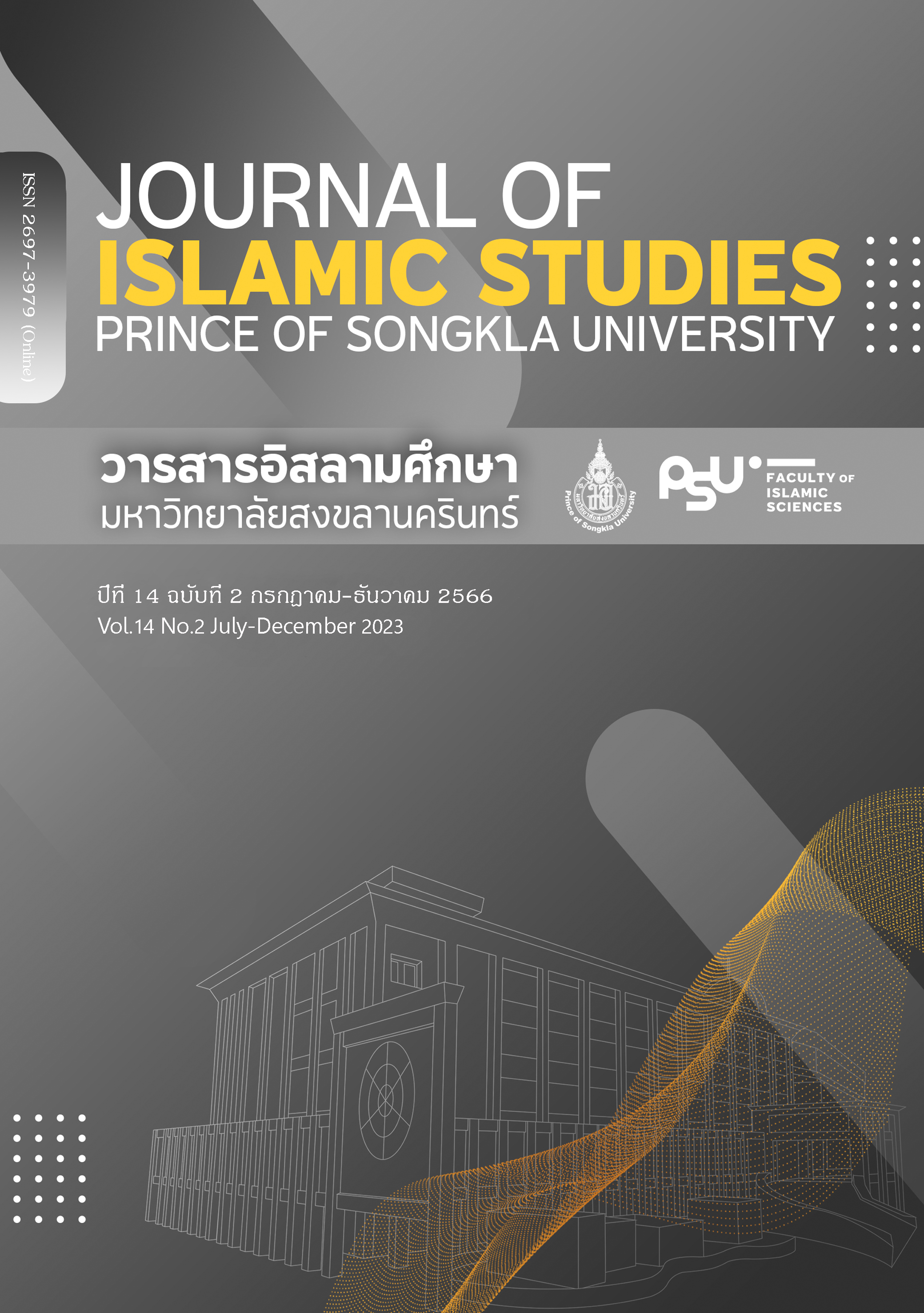Philosophy of Sufficiency Economy and Islam: Its Application to The Muslim Communities in Thailand.
Keywords:
sufficiency economy, Islamic Teaching, Muslim Community, applicationAbstract
Objectives This study aims to find the theoretical interrelation between Islamic teachings and the philosophy of sufficiency economy, as well as to analyze the application of Sufficiency Economy Philosophy in the way of life of Thai Muslims in many different contexts.
Methodology In conducting this research, we utilized a ‘Case Study Research Method’ within the scope of qualitative research that consists of document studies, in-depth interviews and group discussions.
Research findings Four Muslim communities were selected as case studies in this research. The findings showed that the provisions of Islam are in consistent with the key words of the philosophy of sufficiency economy. The teachings of Islam have a huge influence on the Muslim way of life that leads Muslims to live in line with the philosophy of sufficiency economy.
Contribution From the case studies of the 4 Muslim communities we found that when implemented, it makes the Islamic way of life of the Muslim community more structured and concrete, leading them to increase their ability to be self-reliant and build stronger immunity for the community. However, differences in physical and socio-cultural contexts resulted in case studies in each area having different approaches and methods when implementing the philosophy of sufficiency Economy.
References
Ali Tolong, A. M. (2017). Ecosystem and Practices towards Nature in Islam. Islamic.
Assayyid, S. I. (2015). Al-Wasathiyyah: The Middle Path in Islam. (Naim Wongse-ngam, Trans.; 1st ed.). Natwadagar Printing.
Association of Mosque Administrators, Nong Chok District. (2020). Manual of Maulaf (New Muslim).
Foundation for Education and Development of Esarn Muslims. (2011). Celebration of Islamic Esarn Day '54: Memorial Booklet on the Occasion of the 16th Anniversary of Foundation for Education and Development of Esarn Muslims.
Foundation for Education and Development of Esarn Muslims. (2015). Celebration of Islamic Esarn Day, March 13, 2015: Memorial Booklet on the Occasion of the 20th Anniversary of Foundation for Education and Development of Esarn Muslims.
Foundation for Education and Development of Esarn Muslims. (2000). Foundation for Education and Development of Esarn Muslims and Basic Information on Islamic Esarn.
Foundation for Education and Development of Esarn Muslims. (2001). Memorial book for the opening of the Wan Muhamad noor matha building.
Gulan, M. F. (2014). Analysis of the Life of His Holiness Gulen, Ambassador of the Prophet Muhammad. (Bunjong Binkasun, Trans.). TUGHRA BOOKS.
Jitsangwon, T. (2009). "Study of Approaches to Driving Sufficiency Economy: Lessons from 40 Villages" in Proceedings of the 47th Academic Conference of Kasetsart University: Economics and Business. Office of Research Support. https://kukr.lib.ku.ac.th/kukr_es/BKN_ECO/search_detail/result/11661
Laowithi, W. (2562). Islamic Doctrines and Sufficiency Economy Philosophy. Liberal arts journal Rangsit University. 14(2), 127-142. https://rsujournals.rsu.ac.th/index.php/jla/article/view/574/842
Panpakdee, P. (2010). Community Forest Management with Community Participation: A Case Study of Bang Rong Village, Group 3, Pa Khlok Subdistrict, Thalang District, Phuket Province [Master's Thesis, Maejo University]. https://dric.nrct.go.th/Search/ShowFulltext/2/190073
Phansena, A. (2021). Sufficiency Economy: King Rama IX's Wisdom and Grace in the Ninth Reign. Office of Research and Development, Rangsit University.
Special Commission Office for Coordinating Projects Arising from Royal Initiatives. (2013). Bang Rong Community: Application Guide for the Sufficiency Economy Philosophy of the Sufficiency Economy Community Type. http://www.rdpb.go.th/th/Sufficiency/
Senaphan Buamai, T., & Sabaiying, S. (2018). Sufficiency Economy Application: Lessons Learned from Kokmueng Community Bangriang, Kaunniang, Songkhla. Journal of Social Sciences and Humanities Research in Asia (JSHRA). 24(2), 147-146. https://so05.tci-thaijo.org/index.php/psujssh/article/view/148806/109616
Saengwiman, A. (2019). Aqidah, Volume 1. S. Wong Song-yiam Publishing.
Thai Chamber of Commerce. (2007). Sufficiency Economy: New Philosophy in the Age of Globalization. Amarin Printing and Publishing.
Thaworn, C., Srisantisuk, S., Suzuki, N., & Nantabut, K. (2014). The Processes of Mangrove Forest Management in Paklok Bay Community. Journal of Humanities & Social Sciences, 31(1). 65-88.https://so01.tci-thaijo.org/index.php/HUSO/article/view/32269/27558
Wongdeer, N. (2008). Philosophy of Sufficiency Economy and the Teachings of Islam [High Certificate Thesis, Pridi Banomyong Institute]. https://kpi-lib.com/library/en/books/kpibook-12824/
Yosakrai, K. (2019). Community Power and Integration for Sustainable Economy: A Case Study of Buddhist, Muslim, and Akha Communities in Thailand [Doctoral dissertation, Thammasat University]. https://digital.library.tu.ac.th/tu_dc/frontend/Info/item/dc:112350
Zakat (Baytulmaal) Fund, Chiang Mai Province. (2019). Zakat and the Creation of Social Justice.
Zakat (Baytulmaal) Fund, Chiang Mai Province. (2020). Annual Report on Zakat Management for the Fiscal Year 1441 A.H. Meeting on Zakat Management Explanation for the Fiscal Year 1441 A.H. Zakat (Baytulmaal) Fund, Chiang Mai Province.
Downloads
Published
How to Cite
Issue
Section
License
Copyright (c) 2023 © The Author(s). Published by the Journal of Islamic Studies, Prince of Songkla University under the Creative Commons Attribution 4.0 International License.

This work is licensed under a Creative Commons Attribution 4.0 International License.
All articles Published in The Journal of Islamic Studies are author’s opinions, and not the responsibility of the Faculty of Islamic Sciences nor the editorial board. However any citation should be referred to the journal.
















